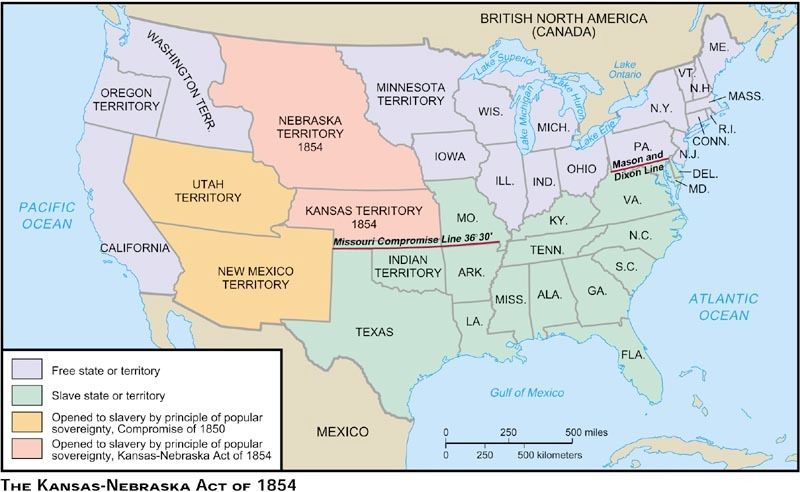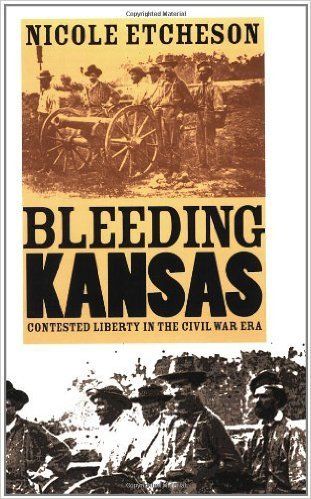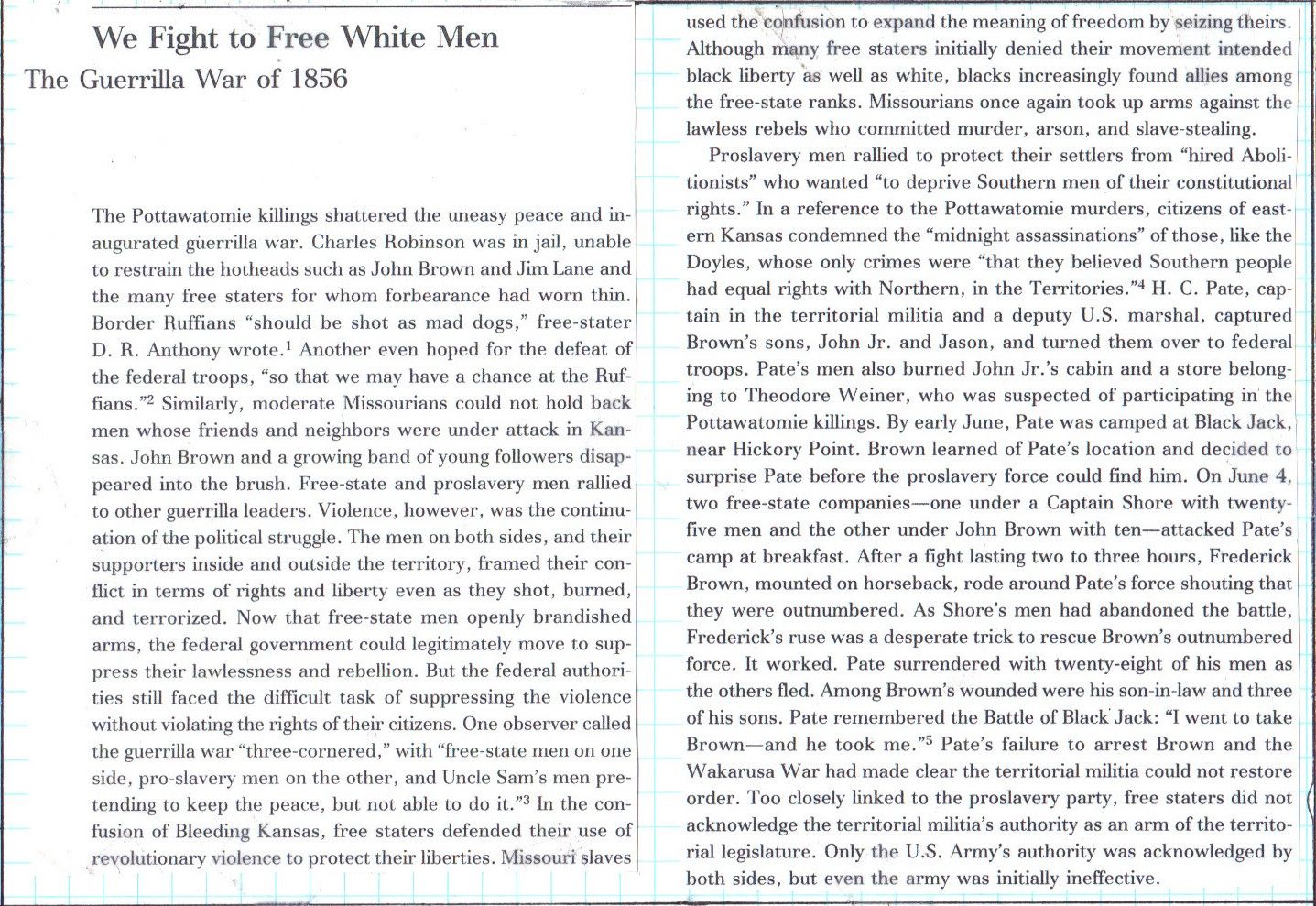
Posted on 06/01/2016 4:47:03 AM PDT by Homer_J_Simpson

New Month, new thread. I will continue with excerpts from the authors named above. Feel free to add items from other sources. It turns out that the May 24 edition of the Chicopee Mass. Weekly Journal was their last. I hope to replace it with selections from Harper’s Magazine in the near future, but I’m not set up for that just yet. I finally figured out that Harper’s Magazine is not related to Harper’s Weekly, which is available on line beginning in 1858.
ping me request
Ping please. Thank you.
Added. Welcome aboard the long march.
The Battle of Black Jack
Abolitionist John Brown knew enough about military strategy to know better than to attack an enemy in broad daylight.
So, he and his men waited until dark on June 1, 1856, to start the four-mile trek from Prairie City to Black Jack Springs, where Capt. Henry Pate and his 35-man pro-Southern militia from Missouri were camped along Captain’s Creek.
Pate was preparing to carry out his orders to capture Brown — but he had already made one miscalculation that day.
“Pate sent five boys to raid (Prairie City) that Sunday morning and expected nothing but an easy time of it. But the church was having a revival, and free-staters were there with their rifles,” said Kerry Altenbernd, onsite tour coordinator at Black Jack Battlefield and Nature Park near Baldwin City.
Three of Pate’s men were captured; the other two escaped. Among the church-goers were Brown and free-state militia Capt. Samuel Shore, who learned about Pate’s camp from the captured men, and assembled their followers to quash the proslavery threat.
After nightfall, the 25 men in the free-state militias started their advance, thinking they could surround and attack Pate’s troops before dawn.
“It didn’t work out that way,” Altenbernd, president of the Black Jack Battlefield Trust, said.
The free-state forces stayed off established trails so they wouldn’t be detected. But the terrain was rough, and they couldn’t carry lanterns because the lights would have been seen for miles on the treeless landscape.
“They only had the starlight to navigate by,” he said. “They didn’t make it there (by daylight).”
The two men who had escaped at Prairie City had made it back to the campsite in time to warn Pate of the approaching free-staters. The captain positioned his men behind four wagons in a semicircle near the creek and posted sentries on the hillsides.
As Brown’s and Shore’s militias approached at sunrise, one of the sentries fired — igniting what some historians consider the first battle of the Civil War.
Read more here:
http://cjonline.com/news/2015-04-13/john-browns-legacy-remains-controversial#
And here:
http://www.thecivilwarmuse.com/index.php?page=battle-of-black-jack

Black Jack battleground in Douglas County, Kansas
https://www.kshs.org/kansapedia/battle-of-black-jack/18315
Battle of Black Jack
The Battle of Black Jack was the first armed conflict between proslavery and antislavery forces in the United States. The battle near Baldwin City on June 2, 1856, had implications far beyond Kansas Territory. Some call it the first battle of the Civil War. The debate over Kansas and the events there clearly marked a turning point in the march toward the Civil War.
The Kansas-Nebraska Act had opened Kansas Territory in 1854 and allowed citizens to determine whether Kansas would be a free or slave state. The territory soon became a battleground became those who supported slavery in the territory and those who opposed it.
On May 21, 1856, Sheriff Jones and a posse of 750 proslavery men raided Lawrence. In retaliation, John Brown and a small group of men—including some of his sons—violently murdered five men living on Pottawatomie Creek on May 24, 1856. These proslavery men had not been involved in the sack of Lawrence.
Accompanied by proslavery militia, Henry Pate set out to find Brown. He captured two of Brown's sons and held them prisoner. On June 2, Brown free-state militia attacked Pate's men encamped on the grounds. About 100 men engaged in a three-hour battle, which led to Pate's surrender.
The battle further divided the nation’s already-polarized abolitionist and proslavery factions. As politicians, newspapers, and citizens watched the story of “Bleeding Kansas” unfold, hints of a larger potentially violent conflict to come became increasingly evident.
Black Jack Battlefield is significant for its association with abolitionist John Brown. Both the battle and the coverage of the battle in the nation’s newspapers introduced John Brown, who called for armed insurrection to end slavery. The battlefield was designated a National Historic Landmark in 2012.

Articles of agreement for the exchange of prisoners after the Battle of Black Jack
Any stats on numbers killed wounded and missing from this battle?
From what I read in the first article, it would seem that no one was killed.
“Fearing the arrival of free-state reinforcements, Pate put up a white flag and the fighting stopped. The battle had lasted nearly three hours. Although several men were injured, no one was killed.”
Well, except the mules and horses:
“To ensure his enemy couldn’t escape, Brown ordered two of his men to shoot Pate’s horses and mules.”
http://cjonline.com/news/2015-04-13/john-browns-legacy-remains-controversial
I’m not surprised, but I had to confirm my suspicions. These guys knew how to shoot, but didn’t know how to fight. Really, this was little different than me and my non-military friends playing paintball all afternoon at White River Paintball. Except the bullets were real. But from a professional’s view, this was not a well conducted “battle.”
Yep. All militia. Basically two engaged mobs.

Continued from May 25 (reply #71).

Nicole Etcheson, Bleeding Kansas: Contested Liberty in the Civil War Era
“Violence was the continuation of the political struggle.”
Now where have we seen that lately?
“I went to take Brown — and he took me.”
Much later, Robert E. Lee and others might have said:
“We hanged Brown, but he hanged us.”
Very impressive series so far. Just so you know, I purchased that Lincoln book by David Herbert Donald that you quoted from earlier. Lincoln was quite a unique and impressive man. Almost completely self taught with barely one year of anything resembling formal education.
His zeal in the cause of freedom was infinitely superior to mine. Mine was as taper as light, his was as burning as the burning sun. Mine was bounded by time. His stretched to the silent shores of eternity. I could speak for the slave. He could fight for the slave. I could live for the slave. He could die for the slave.- Frederick Douglass
My wife will divorce me yet .... so much reading to do
As I've said before about Dred Scott v. Sanford, at this time Alexis de Tocqueville has already written: "There is hardly a political question in the United States which does not sooner or later turn into a judicial one." I believe he is essentially correct; Americans have traditionally not turned to violence to resolve disputes, but instead we run off to the Courthouse. We got a civil war, in large part, because the one judicial chance to avert it was bungled by Chief Justice Taney in Dred Scott v. Sanford.
I'm sure we will revisit this later.
Disclaimer: Opinions posted on Free Republic are those of the individual posters and do not necessarily represent the opinion of Free Republic or its management. All materials posted herein are protected by copyright law and the exemption for fair use of copyrighted works.